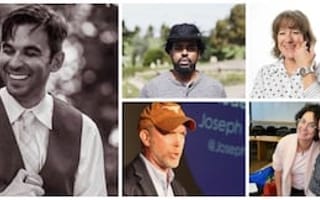Babysitting, cutting grass, serving ice cream — remember the first time you were paid for your work by someone other than a guardian handing you allowance? As simple as those early jobs were, they do teach valuable lessons that can leave an impression as you develop your career.
With that in mind, we caught up with a handful of Austin tech leaders to learn how their first jobs made an impact on their roles today.
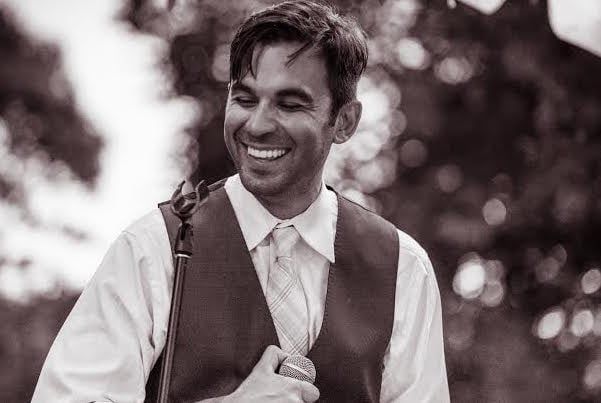
REthink CRM and atx FACTORY founder Vijay Mehra continues to pull valuable lessons from his first ever business — which he started at the ripe age of 7.
What was your first job and how long did you work there for?
My first job was my dog walking company VJ’s Dog Walking Service (my buddy Josh was my business partner, hence VJ). I started the company at age 7 and continued running VJ’s Dog Walking Service for two summers.
What did you learn from that experience?
Walking dogs taught me a lot that applies to my companies today. I learned that in a group, leaders will naturally emerge when given the chance. The biggest lesson my 7-year-old self learned is that it’s ok to step in shit as long as you move forward and continue to learn from it, and never step in the same pile twice.
Does anything from that role play a part in your role today?
At a young age, I saw a gap that needed to be filled and jumped at the opportunity to create a company. Eight years ago, I did the same thing with REthink CRM. I saw an industry I am passionate about with a gap in technology and filled that gap. Today, with my companies (atx FACTORY & REthink CRM) I allow my leaders the freedom to step up and take as much responsibility as they want.
Walking dogs then, and running companies today, it’s clear that in a pack of dogs, or group of people, not all personalities will get along, but everyone is working (or walking) towards a common goal. Dogs, like companies, come in every shape and size. Everyone has their own personal preference, but I’ve learned it's okay to be a small dog (atx FACTORY) amongst big dogs (We Work) — not everyone wants a big dog!
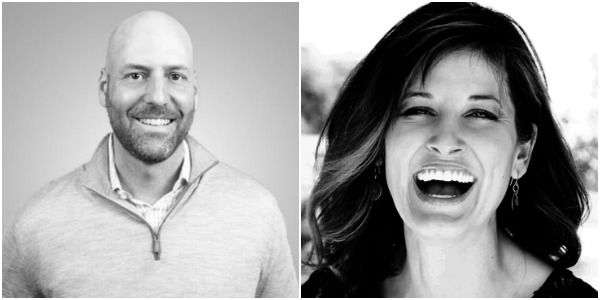
YouEarnedIt co-founders Kenny Tomlin and Autumn Manning shared how their previous roles served as stepping stones to their careers today. Tomlin landed his first professional role in Dallas after a collection of jobs through high school and college. Manning began working at 13, often holding multiple jobs at once to serve as an outlet for her energy and ambition.
What were your first jobs and how long did you work there for?
Tomlin: I worked numerous jobs through high school and college but my first professional job after college was the associate marketing director for a home healthcare company in Dallas. I worked there for two years.
Manning: I’ve worked since I was 13. My first W2 job was a dishwasher at a restaurant. I worked after school, holidays, nights; packing in as many hours as I could. Before graduating college, I moved to Dallas for three months, working at a behavioral clinic for children. Kids with conditions like ADHD, bipolar disorder, Asperger’s and Autism came here for help.
What did you learn from these experiences?
Tomlin: So much. This was 1995 and it was my first experience in learning how to use technology and data for marketing and training. I spent two years there teaching myself how to use Photoshop for creative design and developer tools for creating applications to train health care professionals. I took the skills and experiences of that first job to launch my first company, iSoft which developed computer-based learning software for Fortune 100 companies.
Manning: Though this was a temporary job by design – I worked there for three months —it was the hardest job I’ve ever had; even harder than what I do now. It was difficult because it was so emotionally challenging. I couldn’t just leave my job at the clinic at night, and I always felt like the impact I had needed to be more...more...more.
Experiencing wins felt small to me although they were incredibly important and meaningful to the children. It was almost overwhelming in that it was one person at a time, and I knew I would never be able to help everyone in a way that was satisfying to the hunger I've always had to drive big change through people. I wanted to impact people on a larger scale.
Does anything from those roles play a part in your role today?
Tomlin: That job taught me the value of creativity and intuition in people and that it can and should come from anywhere in a company. My boss empowered a 22-year-old to take risks, experiment, and lead the department in new directions using data and technology. I still had a lot of mundane blocking and tackling work that had to get done as it was an entry-level position, but more and more I was able to create a role for myself where I thrived and added the most value for the business. Empowering people and encouraging them to think and behave like entrepreneurs vs. employees is something I've valued in all of the companies I've founded and led.
Manning: Every job you have is a stepping stone to what you are doing today. At least it should. It does for me. My job at the clinic brought out in me the desire to instill large-scale behavioral change for people. As the CEO of YouEarnedIt and as an entrepreneur in tech, it’s clear that this same notion of caring deeply about driving change at scale can be accomplished through the intersection of positive behavior change and tech for scale, which is what we do at YouEarnedIt.
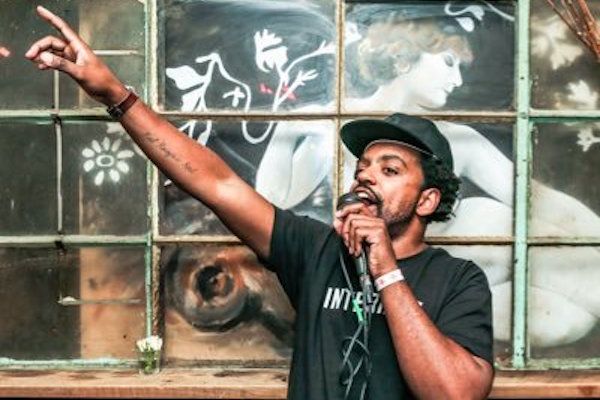
Joah Spearman is the co-founder and CEO of the Austin startup Localeur, an app offering local recommendations from actual locals. The entrepreneur started his first business when he was just 11 years old.
What was your first job and how long did you work there for?
My first paying job was actually owning my own business as an 11-year-old. I started cutting grass and raking leaves for my neighbors in 6th and 7th grade. When I realized I couldn't make money during school hours, I started selling bubble gum to classmates. This money helped me to pay for school clothes, go on field trips and other stuff my mom couldn't necessarily afford.
What did you learn from this experience?
I grew up in a family with my single mom and two older brothers. My dad wasn't around and no one in my immediate family had ever graduated from college. For me, working at this young age and starting something myself helped me to learn a lot of lessons I still apply today like grit, determination, persistence and hustling. I'm not an Ivy League-educated, MBA-graduate kind of entrepreneur. I'm the hustler-turned-tech entrepreneur.
Does anything from that role play a part in your role today?
When you're a young kid going door-to-door trying to make $10 or $15 cutting grass in a working class neighborhood, it teaches you a lot about valuing time and hard work. These people work hard and don't want to pay some pre-teen $15 to do a shitty job. So I've always realized, since then, that I had to go above and beyond to get credit for the work I did.
That's even more true today as a Black founder in tech, an industry with so few ethnic minorities and a gross unfamiliarity with founders of color. I'm thankful for those experiences I gained then because, however small, they prepared me for what I've dealt with pitching hundreds of skeptical investors over the last four years while building Localeur.
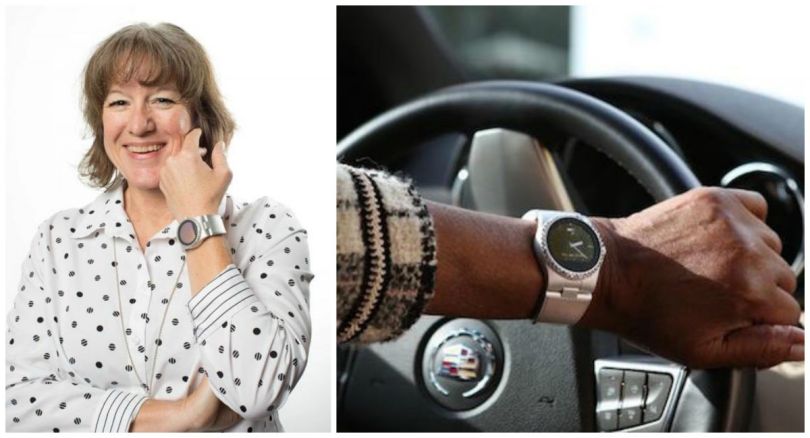
Serial entrepreneur JeanAnne Booth recognized early on the importance of loving what you do — and the role people play in fostering that mindset. The CEO and founder of UnaliWear began her first job in Korea, where her military family was stationed for two years.
What was your first job?
I was a lifeguard for two years at the neighborhood swimming pool in Yongsan (Seoul, Korea) when I was in high school. My father was career military.
What did you learn from this experience?
I learned that no matter how much you love your work, the people you’re with, and the environment you’re in — every job has its boring bits, and you still have to have the self-discipline to execute even the boring bits well.
I’m a water person — happiest in and around the water — and in the lifeguarding job, we also did rotations through the locker room, handing out locker keys. I would have much rather have skipped my turns through the locker room, but you couldn’t have the greatest water job in the world without also taking your turn handing out locker keys.
Does anything from that role play a part in your role today? If so, what?
Even though my jobs have changed significantly over the years, I still love my work, the people I’m with, and the environment I’m in — and every job still has aspects that require self-discipline to execute. So that very first job set the stage for an entire career of the best jobs in the world with fantastic people and great environments, and the tenacity to execute every aspect of the job for the success of my team, company, and self.
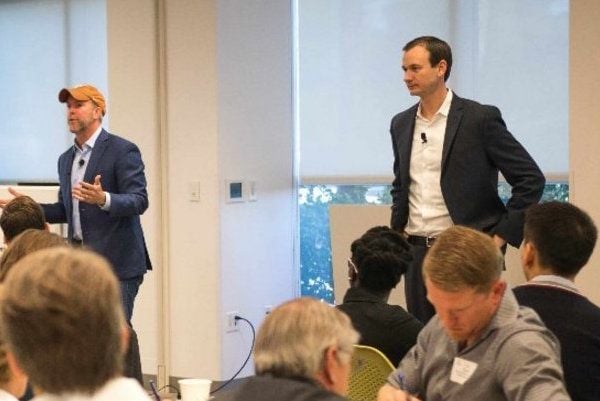
Joseph Kopser, a 20-year veteran of the U.S. Army, founded Ridescout (which he sold in 2014 to Daimler AG). Now, he's the founder of the corporate consulting firm Grayline — but he's been hard at work ever since first becoming a teenager.
What was your first job?
We did not have a lot of money growing up so starting around 13 years old, I mowed lawns in the neighborhood, washed cars at Jack's Auto Clean, mopped floors and emptied trashcans at Barbara Ann's School of Dance, busboy at Del Frisco's as well as dishwasher at Mike and Debbie's restaurant.
What did you learn from these experiences?
From all of these jobs I learned the importance of being on time, working hard, doing what you're told and the satisfaction of a job well done.
Does anything from those roles play a part in your role today?
All of those jobs played a role in who I am today. First, having worked in so many service jobs that I appreciate the value added by all people in the economy. From emptying trashcans to peeling potatoes, it's all honest work and it's got to get to done. I also learned that some people feel "above" those kind of jobs.
As the TV show Dirty Jobs highlights, there is a real gap in understanding in our society of what and who it takes to really power our economy. Lastly, those early jobs are the reason I say "please and thank you" to everyone I come into contact during my everyday. I know how hard their jobs can be. I've been there and I have not forgotten.”
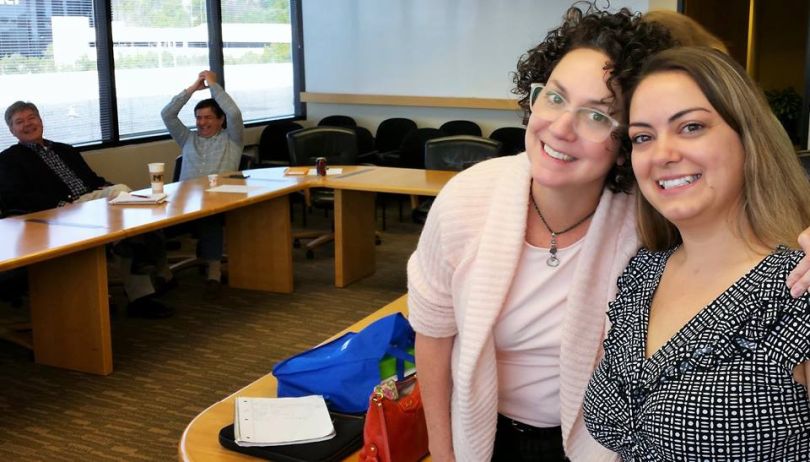
Both of Querium’s founders' careers came from humble beginnings. Co-founder and CEO Kent Fuka's introductory role into the workforce taught him lessons he carries with him to this day. Patti Smith, co-founder and CMO, got a sweet start to her edtech-filled career, which includes stints as VP of marketing at DreamBox Learning and as VP of K-12 math and science strategy for Houghton Mifflin Harcourt in Austin.
What were your first jobs?
Fuka: My first job was working in my grandfather's hardware store in a small town in Illinois.
Smith: My first job was scooping ice cream after a friend’s father opened Ye Olde Ice Cream Shoppe in Richmond, VA.
What did you learn from these experiences?
Fuka: He taught me everything I know about customer service and a strong work ethic.
Smith: I guess my lesson was to network for other jobs.
Fuka: It helped me later when I ran customer support for some tech companies, and when I went on to become a CEO. I keep his picture around to remind me of those lessons.
Images provided by social media.
What would you like to learn about our city's tech leaders? Email us.
